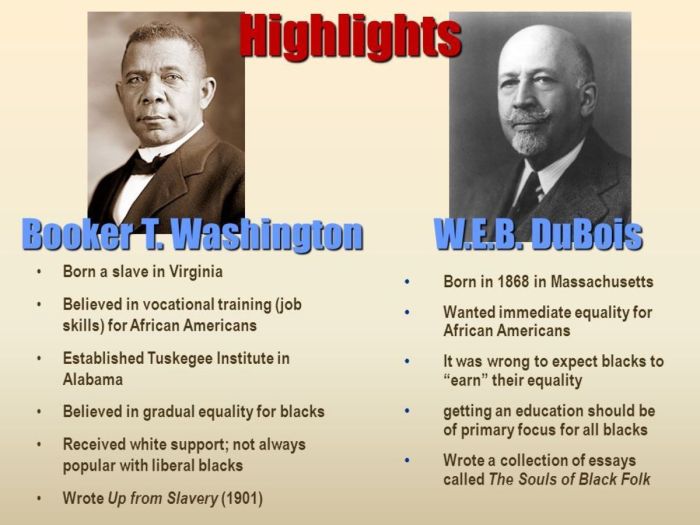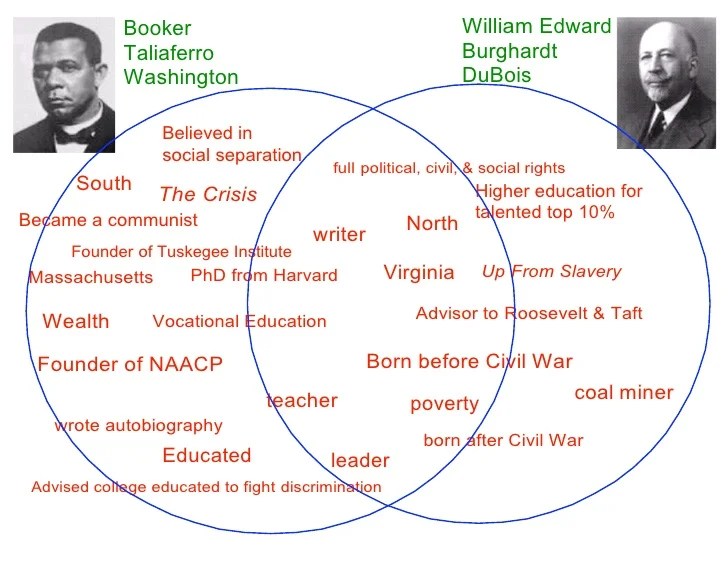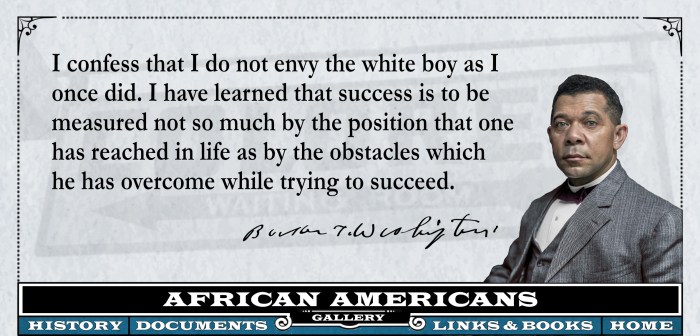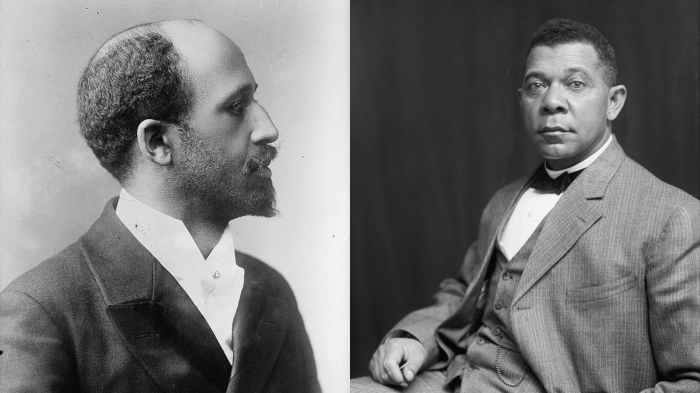The booker t washington vs w.e.b. dubois venn diagram presents a fascinating juxtaposition of two prominent African American leaders and their contrasting philosophies on racial uplift. Booker T. Washington advocated for economic empowerment and gradualism, while W.E.B. Du Bois championed political activism and higher education.
Their divergent beliefs shaped the African American community during their time and continue to influence discussions on race and equality today.
Booker T. Washington vs. W.E.B. Du Bois: A Comparison of Beliefs

Booker T. Washington and W.E.B. Du Bois were two prominent African American leaders who advocated for racial equality during the late 19th and early 20th centuries. While they shared a common goal, their beliefs and approaches differed significantly.
Booker T. Washington’s Beliefs, Booker t washington vs w.e.b. dubois venn diagram
Washington believed that economic empowerment was the key to racial uplift. He argued that African Americans should focus on acquiring skills and building businesses, rather than seeking political or social equality. He also believed in gradualism and accommodation, advocating for African Americans to work within the existing social structure to improve their lives.
Washington’s Tuskegee Institute, founded in 1881, embodied his educational philosophy. The institute emphasized vocational training and practical skills, preparing students for careers in agriculture, mechanics, and other trades.
W.E.B. Du Bois’ Beliefs
Du Bois, on the other hand, believed that political and social activism were essential for racial equality. He argued that African Americans should demand their full rights as citizens, including the right to vote, hold office, and receive equal education and employment opportunities.
Du Bois believed in the “talented tenth,” a group of highly educated African Americans who would lead the fight for racial equality. He founded the Niagara Movement in 1905 and the National Association for the Advancement of Colored People (NAACP) in 1909, two organizations that played a major role in the civil rights movement.
Similarities and Differences in Beliefs
| Booker T. Washington | W.E.B. Du Bois |
|---|---|
| Racial Uplift: Economic empowerment | Racial Uplift: Political and social activism |
| Education: Vocational training | Education: Higher education for the “talented tenth” |
| Political Activism: Gradualism and accommodation | Political Activism: Demand for full citizenship rights |
The similarities between Washington’s and Du Bois’ beliefs stemmed from their shared desire for racial equality. However, their different approaches reflected their distinct experiences and personalities. Washington, a former slave, emphasized practicality and self-reliance, while Du Bois, a Harvard-educated scholar, believed in the power of education and political activism.
Impact of their Beliefs
Washington’s and Du Bois’ beliefs had a profound impact on the African American community. Washington’s Tuskegee Institute became a model for vocational education and helped to create a black middle class. Du Bois’ activism helped to raise awareness of racial inequality and to lay the groundwork for the civil rights movement.
Today, their ideas continue to shape discussions on race and equality. Washington’s emphasis on self-reliance and economic empowerment remains relevant, while Du Bois’ call for political and social activism continues to inspire activists and leaders.
Clarifying Questions: Booker T Washington Vs W.e.b. Dubois Venn Diagram
What were Booker T. Washington’s key beliefs?
Washington believed in racial uplift through economic empowerment and gradualism within the existing social structure.
What were W.E.B. Du Bois’ key beliefs?
Du Bois believed in racial equality through political and social activism, emphasizing the importance of higher education for African Americans.
How did Washington’s and Du Bois’ beliefs differ?
Washington advocated for accommodation and gradualism, while Du Bois championed more confrontational activism and immediate equality.


